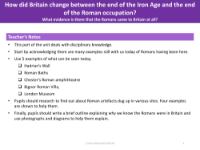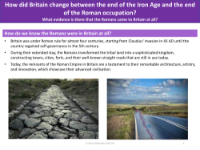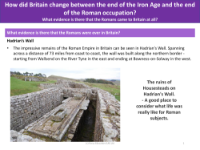What evidence is there that the Romans came to Britain at all? - Presentation

History Resource Description
The evidence of Roman presence in Britain is indisputable, with numerous historical artefacts and architectural marvels scattered across the country. The remnants of Hadrian's Wall, an imposing structure spanning 73 miles, mark the northern boundary of the Roman Empire in Britain and serve as a significant historical landmark. Meanwhile, the Roman Baths, centred around natural hot springs in the city of Bath, provide a well-preserved glimpse into the daily life of the Romans, despite the prohibition of bathing in the waters today. Chester's Roman amphitheatre, the largest stone-built amphitheatre in Britain, though only partially uncovered, offers a vivid insight into Roman entertainment and highlights Chester's importance as a Roman settlement. Bignor Roman Villa stands as a testament to Roman wealth and craftsmanship, boasting some of the finest mosaics found in Britain, such as the Ganymede and Head of Medusa.
Additional evidence of Roman Britain is showcased in the extensive collection of over 47,000 artefacts housed at the Museum of London, which includes items discovered during archaeological excavations. Londinium, modern-day London, was a major Roman city and port during the period from 50 AD to 410 AD. Roman coins, though rare, have been unearthed across various sites in Britain, further solidifying the Roman influence. The introduction of a new form of art, distinct from Iron Age art, along with the presence of Roman mosaics and evidence of slavery through artefacts like handcuffs, paints a picture of a society transformed by Roman occupation. These findings not only confirm the Roman presence in Britain but also illustrate the changes that occurred from the end of the Iron Age to the end of Roman rule, highlighting the profound impact of Roman civilisation on British history.





